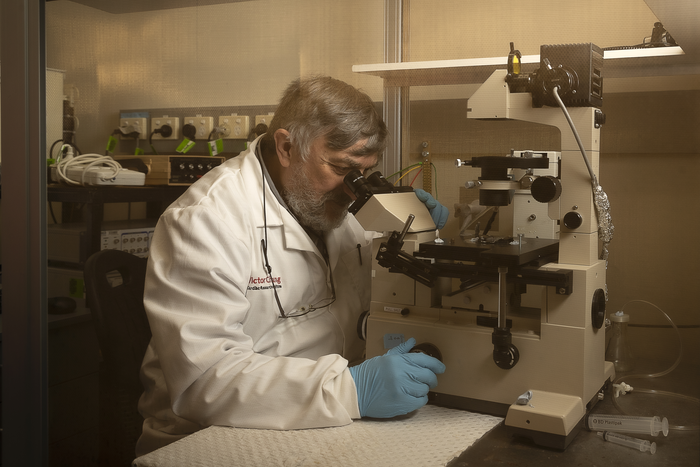Scientists have identified an important new mechanism that causes the heart’s muscle to thicken which markedly increases the risk of irregular heart rhythms and heart failure.

Credit: Victor Chang Cardiac Research Institute
Scientists have identified an important new mechanism that causes the heart’s muscle to thicken which markedly increases the risk of irregular heart rhythms and heart failure.
The discovery by a team at the Victor Chang Cardiac Research Institute could herald the way for a new treatment for the heart disorder known as cardiac hypertrophy.
The Institute’s Professor Boris Martinac said the findings published in Nature Cardiovascular Research were a major breakthrough in our understanding of one of the main drivers of heart disease.
“Cardiac hypertrophy is a key risk factor for premature cardiac death and is a major cause of heart failure,” said Professor Martinac, the lead author of the paper.
“We have finally been able to pinpoint one of the key reasons why the heart muscle wall thickens and identified the molecules and the pathways that cause this process to take place.”
Cardiac hypertrophy, which affects around one in every 500 people[1], is caused by many common conditions including abnormally high blood pressure and narrowing of one of the heart valves (aortic stenosis).
It’s a condition that causes the wall of the main pumping chamber (left ventricle) to thicken. Over time this thickening can cause abnormal heart rhythms and lead to heart failure. Once heart failure develops, the five-year survival is less than 50%.
The discovery
The new research identified the exact molecules in the heart muscle cells responsible and crucially discovered how they were communicating with one another in a mouse model. They discovered that a molecule called Piezo1 triggered a signaling process, with another partner molecule, in cardiac muscle cells.
The discovery paves the way to develop a peptide that will stop these molecules from ‘talking’ to each other. This could prevent the heart muscle from thickening in the first place or stop any further thickening in those already affected.
Currently, there are few therapeutic options for severe hypertrophy. The traditional approaches include lowering the patients’ blood pressure or replacing a stenotic aortic valve – neither of which can reverse the damage caused by hypertrophy.
Fellow author Dr Jane Yu said: “We hope that in the long-term, as soon as we see evidence of heart muscle thickening you will be given a treatment, perhaps a small peptide, that will stop the process from progressing in your heart. This could even potentially be given to people with severe hypertension to avoid them developing cardiac hypertrophy in the first place.
“This preventative treatment could make a huge inroad into reducing the number of people affected by heart disease in Australia and save many lives in the future.”
How it could help heart attack victims
The same team at the Institute is also exploring how this discovery could also help with the recovery of heart attack victims.
Professor Martinac said: “When someone has a heart attack, many of their muscle cells will die and the heart loses its ability to pump as effectively, so it will compensate by thickening its muscle wall.
“A therapeutic that halted this process could be transformative for people who have a heart attack and prevent deaths in the longer-term post-heart attack.
“Whilst this is early days in our research, there are similar treatments showing promise in stroke victims, so we are incredibly excited about the potential of our discovery.”
Ends
The Victor Chang Cardiac Research Institute is Australia’s home of heart research. Utilizing world best technology, the Institute is renowned for the quality of its scientific breakthroughs in its pursuit to discover better ways to diagnose, treat and prevent the onset of cardiovascular disease. For more information, visit https://www.victorchang.edu.au/
Journal
Nature
Method of Research
Experimental study
Article Title
Piezo1 is the cardiac mechanosensor that initiates the cardiomyocyte hypertrophic response to pressure overload in adult mice
Article Publication Date
13-Jun-2022




